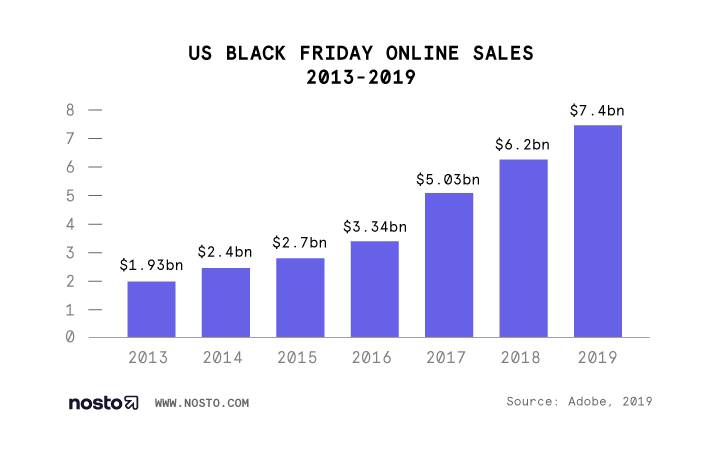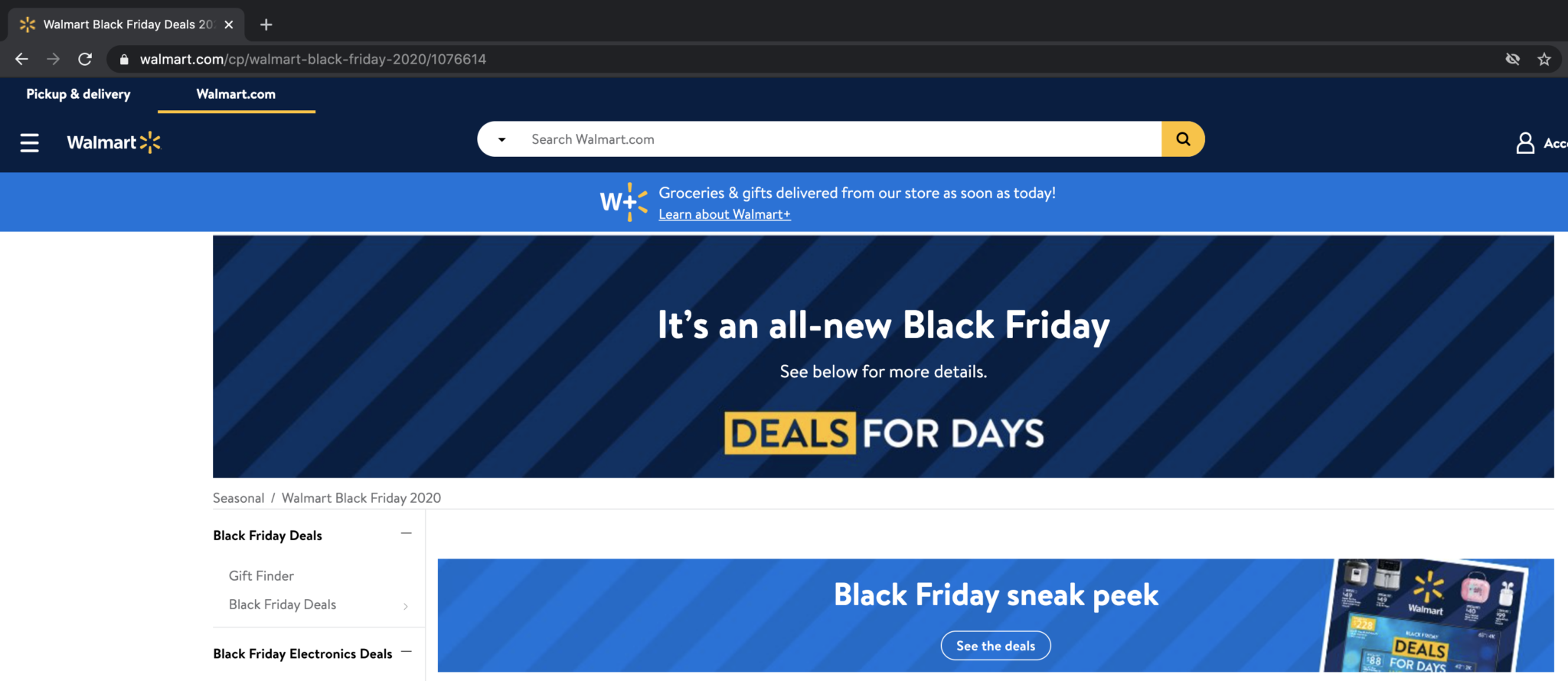Self-isolation; shielding; social distancing: these are all phrases we use freely in 2020, but would have felt totally alien in 2019. You might be wondering what on earth this has to do with Black Friday, so we’ll explain.
The shopping landscape has been altered in a big way this year, and it doesn’t look like this will be changing back any time soon. Fewer people are able to get to physical store locations because of local lockdowns, or the reasons listed above. And due to lower footfall, some retailers are closing the doors of some of the properties in their real estate portfolio.
Online shopping has suddenly become much more important, as it’s providing a more accessible way for people to buy appliances, gifts, clothing, and more.
At this time of year, there is an extra keenness for bargain buys and boast-worthy deals. In the run-up to the holiday season, there is a shopping frenzy to get gifts sorted for friends and family members, so sale periods are the perfect opportunity for people to stock up.
Are you ready for Black Friday?
Which leads to this important question: are you ready for Black Friday?
There has been continued growth in US online sales for Black Friday in previous years, and this year could be the biggest yet. If you consider that 2019 saw online sales of $7.4bn in the US when physical stores had zero Covid-19 restrictions, imagine what 2020 could hold!

As a marketer for a retailer, it pays to be prepared. It isn’t enough to assume that if you have an online store, people will come and buy from you. It takes a good chunk of preparation to get the online experience ready for increased traffic, deal-hungry shoppers, and to ensure that people can find what they’re looking for.
Pause now to consider how prepared you are for Black Friday. Have you and your marketing team invested resources into setting up for a successful online shopping period? Or is there more you could do – particularly in regards to search engine optimization (SEO)?
It’s not too late to start
There is no need to panic if you don’t feel entirely ready for Black Friday and the lead up to the holiday season. Whether you are reading this guide in the fall, or have stumbled upon it later in the future, there are still some key learnings that you can take away for use on your eCommerce website.
In this resource, we’ll be taking you through some of the SEO strategies that can help to get your website ready for Black Friday (and beyond).
The areas that we’ll be covering include:
- Technical SEO essentials
- On-page SEO essentials
- Some helpful bonus tips
After you’ve read through this guide and checked out some of our referenced sources, you’ll be able to get your marketing strategy back in line with the digital-first shopping trend that has become so prominent this year.
Technical SEO for eCommerce
Let’s start with the area that will either strike fear into your heart or get you in the mood for a thorough investigation: technical SEO.
Issues with technical SEO could ultimately mean missing out on sales if your web pages are unable to be crawled, processed, or indexed by search engines. And not only that, but technical issues can impact users directly on your website too.
The good news is that there are plenty of specialists who are more than keen to share their technical SEO expertise, so there are people in your network you can rely on for support. In the meantime, we’ve compiled some technical SEO recommendations specific to Black Friday that you may find helpful.
Before we start, here’s a handy tip for you: if you work in a multi-department environment, make sure to book development time early so your jobs are in the dev queue. It’s always a good idea to give tasks a priority order so you can get the most important bits done first, and worry about the rest later.
Event URLs
One of the most simple mistakes made by eCommerce stores is to get too specific with URLs, using a new URL for each version of an event (like /black-friday-2020). The problem with this is that you would have to build fresh backlinks and authority every year and to hope that search engines would find and index your new URL.
Here’s a perfect example of how not to structure your Black Friday URLs:

Instead, use a single URL and refresh the content of this page each year.
As suggested by The Telegraph: “A consistent year-round Black Friday webpage on your website will save you a space in the search engines’ indexes, meaning that you can be there when traffic begins to develop to a notable degree from August.”
Make sure that your store’s online header navigation is updated to include your main Black Friday landing page ahead of the day itself. Many people like to start their research early, and you can countdown to certain deals that are likely to generate interest (and the all-important backlinks from publications doing Black Friday deal round-ups!).
Internal search functionality
Marketer Luke Carthy wrote a blog post in 2019 which highlighted some major UK retailers that failed to get ready for Black Friday. The issue he noted was that eCommerce stores hadn’t set up their internal site searches to provide extensive (or any!) results for the phrase ‘black friday’.
After sharing some of the examples he found, Luke rounded off by saying: “Optimising internal search is essential for eCommerce growth, CRO and ensuring you’ve a distinct competitive edge.”
If your company doesn’t take part in Black Friday, it can still make sense to have a landing page where users can learn about the reasons why. This may be because your prices are always competitive, or because you will be running sales or deals on another date on the run-up to the holidays.
Internal linking
Aside from the internal search functionality, you’ll want to get your internal linking structure looking good too. Rather than just building a Black Friday page and letting it run to its own devices, why not get a content strategy in place for your blog (and social media channels)?
If you have the resource available, think about how you can create helpful content ahead of Black Friday and the holiday shopping period. Gift guides are a simple option, or you can do a set of product reviews or comparisons. Within these blog posts, you can link to your Black Friday landing page, and you could change them later on to go directly to individual product pages for the rest of the year.
Faceted navigation
If you use faceted navigation on your eCommerce store to help users find what they’re looking for, use Black Friday as a reminder to audit this again. As products get added to the website, you may end up with many more ways (via URLs) for users to find a list of suggested products than you ever imagined.
Helpful for users; not so helpful for search engines. You’ll end up with duplicate content, a risk of important pages not being crawled due to the bloat of possible pathways, and will dilute link equity if backlinks are pointing to a host of similar pages.
Spend some time assessing your options for the solutions that could work for your eCommerce store, and you’ll see the benefits all year round. This Moz post is a good place to start if you’re still learning the basics.
DeepCrawl’s Ruth Everett suggests that “the first step to finding these pages is to identify the URL pattern used for multiple facet selection. These URLs will typically include parameter handling characters such as ? or # and query strings, but may also sit at the folder level following a forward slash.”
Once you have identified these, you can then look for these URLs in website crawls and find the pages which are indexable with followed links, as well as those with search impressions from GSC.
Page errors and stock management
As Carolyn Lyden recently shared on her website Search Hermit, it is important to be aware of your inventory all throughout the holiday season for the best customer experience.
She shared the following advice: “Out of stock items are inevitable, so make sure to establish a system so that when visitors find out of stock items or pages that no longer exist, they’re provided with alternate options.”
Her recommendations were to customize 404-error pages to include similar products to the one the customer was looking for, or potentially to have an out of stock product to redirect to a similar product with a pop-up that explains that the original item is out of stock.
Robots.txt or noindex
There is never a bad time to do some basic technical auditing, and it’s worth doing this before your web traffic is due to peak for Black Friday and beyond.
Within this auditing, you’ll want to take a look at your robots.txt file and make sure nothing has ended up there that shouldn’t have. Like a key section of the website, a Black Friday landing page, or maybe disallowing the entire website (it happens).
If you have had dev work on your Black Friday landing page that hasn’t been done in a staging environment, make sure any noindex tags have been removed well in advance. Something simple like this could feel crippling if your competitors end up taking the lion’s share of Black Friday sales and profit.
On-page SEO for eCommerce
Now let’s take a look at some practical strategies to get your on-page SEO in place for Black Friday and the rest of the holiday season.
In this section, you’ll find some tips that will be helpful beyond the usual big sale events, but it’s worth getting any related issues addressed as soon as possible to benefit from the expected uptick in traffic.
Metadata
When was the last time you did a refresh of your product and category page metadata? Now could be a good time to do this. You may help your product listings to stand out better in the SERPs if your page titles and meta descriptions are improved from what they currently are.
Alongside this, you’ll also want to pay particular attention to your Black Friday landing page. If you’re using an existing landing page from previous Black Friday shopping events, you’ll need to update your year modifiers from 2019 to 2020. You may also want to use any remaining pixels to highlight specific benefits from you as an online retailer.
Things like ‘next day delivery’ or ‘sale begins on…’ can be good teasers, but you’ll need to make sure you can actually fulfill your customer’s expectations or you’ll end up with a bunch of negative reviews.
Headings and subheadings
After you’ve ticked off your metadata requirements, look towards some of the on-page elements that users will see when they are scrolling through your website. Namely, your page headings and subheadings.
You will want to pick up generic traffic to your Black Friday landing page, and to do this you’ll need to incorporate terms like ‘deals’, ‘offers’, and other modifiers of Black Friday sales.
This is summarized nicely by The Telegraph, who said: “Make sure that your strategy for Black Friday includes efforts to target generic, yet popular, Black Friday searches in addition to product-focused targets.”
Page copy
As Ruth Everett explained on the DeepCrawl blog, “A common challenge across eCommerce sites is making sure content is unique and useful for customers, particularly on product pages.”
It may not be the case for your own online retail store, but some eCommerce websites – particularly those with many thousands of pages – will copy product specifications and descriptions from a manufacturer.
Because this will be seen by search engines as duplicate content, it is worth updating product descriptions to be unique and to provide more helpful information. This is a longer-term project, but you can start ahead of Black Friday and the holiday season by rewriting the copy for the products that are likely to be big sellers in the sales this year.
If your competitors sell the same set of products, read the customer reviews or questions to get a better understanding of what it is that people actually want to know. You’ll then naturally be able to create great content that helps to convert into sales.
Deal-driven
Taking into account the two sections above, it’s worth considering this point: some shoppers have no idea what they’re looking for. Sure, some consumers may know that they’re looking for deals on electronics, appliances, or clothing, but others are totally winging it.
Some shoppers use Black Friday and other seasonal sales to have a look at what they could find, not what they need or are necessarily looking for. It’s very much along the lines of this:
- “Oh wow, a rice cooker! That would be better than cooking rice on the stove.”
- “Cute purse. That color would be great for mom’s Christmas gift.”
- “Matching pajamas for the family? That would be perfect for stocking fillers.”
They see the product and the deal first, then they justify why they need to buy it. It’s likely that you’ll have done this before too, and you don’t really pay much attention to it at the time.
This is why getting those generic sale/deal/discount/offer modifiers into your on-page elements is so important. You need to pick up that traffic that converts someone from a window shopper to a customer.
Conclusion
Now it’s up to you to get the team into action so you can tackle Black Friday head-on this year. As we’re now living in a digital-first era for shopping, it is more important than ever before to be organized ahead of the seasonal rush.
If you are operating in a small marketing team, or you still have co-workers on leave, go through this post and pick out the areas that you can action ahead of Black Friday, even if you can’t get to them all. It’s worth the investment, as online sales are likely to be at their highest ever for Black Friday this year, and it would be a shame to miss out on your share of profits.
Now more than ever, you will want to make sure you are relying on the right data and information to make decisions, so before you get started, check out your SEO toolkit to see if you’ve got everything covered.





